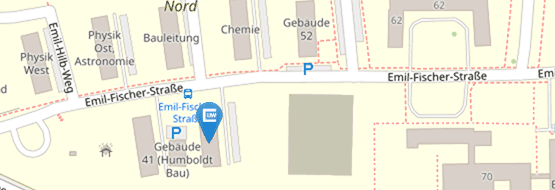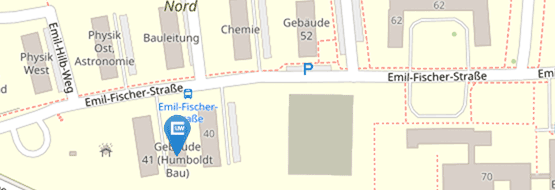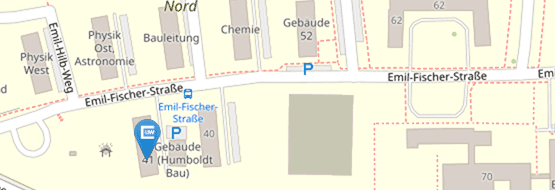Inhaber der Juniorprofessur
Prof. Dr. Anton Freund
Inhaber der Juniorprofessur
Juniorprofessur am Lehrstuhl für Mathematik III (Mathematische Logik)
Emil-Fischer-Straße 40
97074
Würzburg
Gebäude:
40 (Mathematik Ost)
Raum:
02.012
Telefon:
+49 931 31-80576
E-Mail:
anton.freund@uni-wuerzburg.de

Unter den folgenden Links finden Sie Informationen zu
Ich bin Mitglied der Gleichstellungskommission des Instituts für Mathematik. Wenn Sie entsprechende Anliegen haben, sprechen Sie mich gerne an oder schreiben Sie mir eine Email. Beachten Sie auch gerne die Website der Gleichstellungsbeauftragten unserer Fakultät, Prof. Dr. Marie Schmidt.
-
2008-14: Bachelor- und Masterstudium an der LMU München mit Auslandsjahr in Paris
-
2014-18: Promotion bei Michael Rathjen in Leeds
-
2018-21: Postdoc bei Ulrich Kohlenbach in Darmstadt
-
2021-23: Emmy-Noether-Gruppenleiter (DFG) in Darmstadt
-
seit 2023: Tenure-Track-Professor und Emmy-Noether-Gruppenleiter in Würzburg
Publikationen
Vorlesungsskripte finden Sie über den Link zu Materialien
-
More conservativity for weak Kőnig’s lemmaDocumenta Mathematica, 17 pp, to appear
- [ arxiv ]
-
Dilators and the reverse mathematics zooJournal of Mathematical Logic, 23 pp, to appear
- [ arxiv ]
-
Reverse mathematics of a uniform Kruskal-Friedman theoremThe Journal of Symbolic Logic, 25 pp, to appear
-
Provable better quasi ordersNotre Dame Journal of Formal Logic, 66, 175-188 (2025)
-
Weak well orders and Fraïssé’s conjectureThe Journal of Symbolic Logic 90, 1522-1537 (2025)
-
Fraïssé’s conjecture, partial impredicativity and well-ordering principles, part IProceedings of the American Mathematical Society 153, 937-946 (2025)
-
The logical strength of minimal bad arraysProceedings of the American Mathematical Society 152, 4993-5005 (2024)
-
Higman’s lemma is stronger for better quasi ordersOrder 41, 753-759 (2024)
-
Normal functions and maximal order typesJournal of Logic and Computation, 34, 1064-1081 (2024)
-
Bachmann-Howard derivativesArchive for Mathematical Logic 62, 581-618 (2023)
-
Bounds for a nonlinear ergodic theorem for Banach spacesErgodic Theory and Dynamical Systems 43, 1570-1593 (2023)
-
The uniform Kruskal theorem: between finite combinatorics and strong set existencePhilosophical Transactions of the Royal Society A 381, article no. 20220016, 16 pp (2023)
-
On the logical strength of the better quasi order with three elementsTransactions of the American Mathematical Society 376, 6709–6727 (2023)
-
Well ordering principles for iterated Pi^1_1-comprehensionSelecta Mathematica 29, article no. 76, 83 pp (2023)
-
Minimal bad sequences are necessary for a uniform Kruskal theoremAdvances in Mathematics 400, article no. 108265, 44 pp (2022)
-
Patterns of resemblance and Bachmann-Howard fixed pointsSelecta Mathematica 28, article no. 19, 32 pp (2022)
-
R.E. Bruck, proof mining and a rate of asymptotic regularity for ergodic averages in Banach spacesApplied Set-Valued Analysis and Optimization 4, 323-336 (2022)
-
A mathematical commitment without computational strengthThe Review of Symbolic Logic 15, 880-906 (2022)
-
Boundedness theorems for flowers and sharpsProceedings of the American Mathematical Society 150, 3973-3988 (2022)
- [ DOI ]
-
Derivatives of normal functions in reverse mathematicsAnnals of Pure and Applied Logic 172, article no. 102890, 49 pp (2021)
-
Ackermann and Goodstein go functorialPacific Journal of Mathematics 313, 251-291 (2021)
-
Well ordering principles and Pi^1_4-statements: a pilot studyThe Journal of Symbolic Logic 86, 709-745 (2021)
-
Predicative collapsing principlesThe Journal of Symbolic Logic 85, 511-530 (2020)
-
From Kruskal’s theorem to Friedman’s gap conditionMathematical Structures in Computer Science 30, 952-975 (2020)
-
Set-theoretic reflection is equivalent to induction over well-founded classesProceedings of the American Mathematical Society 148, 4503-4515 (2020)
-
What is effective transfinite recursion in reverse mathematics?Mathematical Logic Quarterly 66, 479-483 (2020)
-
Short Proofs for Slow ConsistencyNotre Dame Journal of Formal Logic 61, 31-49 (2020)
-
How strong are single fixed points of normal functions?The Journal of Symbolic Logic 85, 709-732 (2020)
-
A note on ordinal exponentiation and derivatives of normal functionsMathematical Logic Quarterly 66, 326-335 (2020)
-
Computable aspects of the Bachmann-Howard principleJournal of Mathematical Logic 20, article no. 2050006, 26 pp (2020)
-
A categorical construction of Bachmann-Howard fixed pointsBulletin of the London Mathematical Society 51, 801-814 (2019)
-
Pi^1_1-comprehension as a well-ordering principleAdvances in Mathematics 355, article no. 106767, 65 pp (2019)
-
A note on iterated consistency and infinite proofsArchive for Mathematical Logic 58, 339-346 (2018)
-
Proof lengths for instances of the Paris-Harrington principleAnnals of Pure and Applied Logic 168, 1361-1382 (2017)
-
Slow reflectionAnnals of Pure and Applied Logic 168, 2103-2128 (2017)
-
Lattice-based and topological representations of binary relations with an application to musicAnnals of Mathematics and Artificial Intelligence 73, 311-334 (2015)
- [ DOI ]
-
A Uniform Characterization of Sigma_1-Reflection over the Fragments of Peano ArithmeticIn: Mainzer, K., Schuster, P., and Schwichtenberg, H. (eds.) Proof and Computation II. From Proof Theory and Univalent Mathematics to Program Extraction and Verification. pp. 189-253. World Scientific, Singapore (2022)
- [ DOI ]
-
Proof mining a nonlinear ergodic theorem for Banach spaces (abstract)Dagstuhl Report 11, 158-159 (2022)
- [ DOI ]
-
Goodstein’s theorem meets reverse mathematics (abstract)Oberwolfach Report 34, 1701-1703 (2020)
- [ DOI ]
-
Type‐Two Well‐Ordering Principles and Pi^1_1-Comprehension (abstract)The Bulletin of Symbolic Logic 24, 228 (2018)
- [ DOI ]
-
The slow reflection hierarchy (abstract)The Bulletin of Symbolic Logic 23, 240-241 (2017)
- [ DOI ]
-
Proof Length and the Paris‐Harrington Principle (abstract)Oberwolfach Report 14, 3129–3130 (2017)
- [ DOI ]
-
Where can we really prove instances of the Paris‐Harrington Principle? (abstract)Proceedings in Applied Mathematics and Mechanics 16, 903-904 (2016)
- [ DOI ]





